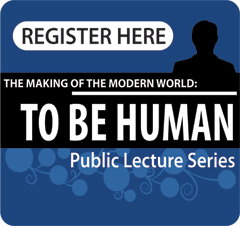Free and Public Lectures Series at UC San Diego Explores What it Means To Be Human
By:
- Christine Clark
Published Date
By:
- Christine Clark
Share This:
Article Content
What does it mean to be human? Are there essential human qualities and characteristics? How do we know what they are? And how did we acquire them? These questions will be explored in “Making of the Modern World: To Be Human,” a nine-part public lecture series on the campus of the University of California, San Diego featuring some of the university’s preeminent speakers from various academic departments.
The series begins Jan. 18 with a talk on “How Food Fueled Human Origins” and will conclude March 14 with a lecture on “Political Perspectives on Being Human in the 20th Century.”
“Making of the Modern World” is a multi-course general education sequence designed by Eleanor Roosevelt College, one of UC San Diego’s six colleges, to provide students with a broad, global overview of the past from the emergence of the human species to the contemporary world. The “To Be Human” series was created, in part, to showcase the “Making of the Modern World” academic program to the San Diego community.
“We’re excited to share the uniqueness of ‘Making of the Modern World’ with a broader audience,” said Eleanor Roosevelt College Provost Alan Houston. “Part of the university’s mission is to contribute to the community, and this series speaks to that mission.”
The free lectures will take place Jan. 18 through March 14, beginning at 7:00 p.m. in the Great Hall at UC San Diego’s International House, unless otherwise noted. Speakers and their programs include:
- Jan. 18, 7 p.m.––Margaret Schoeninger, professor of anthropology, “How Food Fueled Human Origins.” At 6:30 p.m., there will be a reception with light hors d’oeuvres on the Great Hall patio.
- Jan. 25, 7 p.m.–– William H.C. Propp, professor of history, “In His Image and Likeness: Being Human in Ancient Israel.”
- Feb. 1, 7 p.m.––Matthew T. Herbst, director of “Making of the Modern World,” “Desire, Temptation and Spiritual Struggle: Historical Christian Perspectives on Being Human.”
- Feb. 8, 7 p.m.––Suzanne Cahill, professor of history, “Suffering, Enlightenment and Immortality: Chinese Buddhists and Daoists on the Human Condition.”
- Feb. 15, 7 p.m.––Hasan Kayali, professor of history, “The Divine and the Human in Islamic Tradition: A Historical Perspective.”
- Feb. 23, 6 p.m.––Steve Kay, dean of the Division of Biological Sciences, “Humanity’s Greatest Challenge — Food, Fuel and the Future.”
*Note this event will be held in the Faculty Club, with light hors d’oeuvres, beginning at 5:30 p.m.
- Feb. 29, 7 p.m.––Seth Lerer, dean of the Division of Arts and Humanities, “The Verve: How We Became Modern.”
- March 7, 7 p.m.––Terrence Sejnowski, Francis Crick Professor of Biology, Salk Institute, “What Makes the Human Brain Human.”
- March 14, 7 p.m.––Pamela Radcliff, professor of history, “Political Perspectives on Being Human in the 20th Century: Fascism, Communism and Democracy.”At 6:30 p.m. there will be a reception with light hors d’oeuvres on the Great Hall patio.
The college system at UC San Diego is designed to provide students with many of the advantages of a small liberal arts college plus the opportunities and resources of a large research university.
Seating for free the “To Be Human” series is limited and registration is recommended. To register, go to http://roosevelt.ucsd.edu/publicevents/index.html. For more information on Eleanor Roosevelt College’s “To Be Human” series, please visit http://roosevelt.ucsd.edu/publicevents/ .
Share This:
You May Also Like
Stay in the Know
Keep up with all the latest from UC San Diego. Subscribe to the newsletter today.




